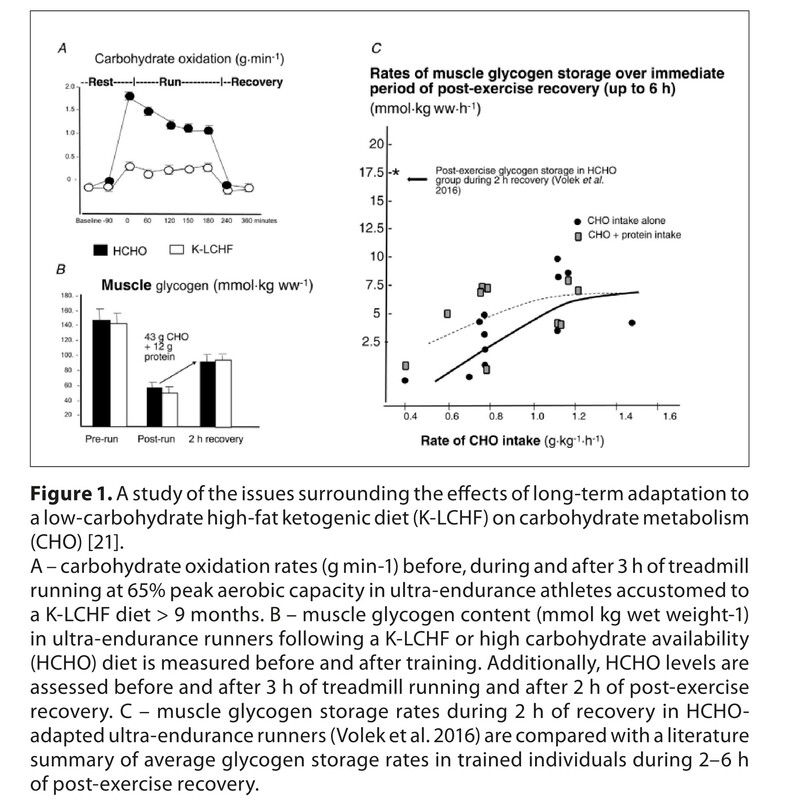REVIEW PAPER
The power of ketogenic diet in physical performance – review of the latest research
1
Independent Public Health Care Facility Municipal Hospital Complex in Chorzów, Poland
2
University Clinical Hospital of the Military Medical Academy – Central Veterans' Hospital, Łódź, Poland
3
Provincial Specialist Hospital No. 5, Sosnowiec, Poland
Corresponding author
Anna Martyka
Independent Public Health Care Facility Municipal Hospital Complex in Chorzów, Strzelców Bytomskich 11, 41-500, Chorzów, Polska
Independent Public Health Care Facility Municipal Hospital Complex in Chorzów, Strzelców Bytomskich 11, 41-500, Chorzów, Polska
Med Srod. 2023;26(3-4):99-102
KEYWORDS
TOPICS
ABSTRACT
Introduction and objective:
Restrictive diets are growing in popularity as more athletes attempt to improve their physical performance. One such diet that has recently attracted interest is the ketogenic diet, which drastically restricts carbohydrate intake to fewer than 20g per day. The primary objective of this diet is to induce a metabolic state called ketosis, which results in the production of ketone bodies and allows the body to primarily rely on fat as a source of energy. The purpose of this study was to investigate the effects of a ketogenic diet on athletic performance.
Brief description of the state of knowledge:
The reported reduction in body weight and body fat remained unaffected by weightlifting performance. Maximal aerobic performance remained unaltered. Running performance over 5 km and endurance during CrossFit training showed no significant differences. During the Wingate test, the ketogenic diet decreased average and peak power by 6% and 7%, respectively. The total distance run in the yo-yo intermittent recovery test was 15% less after the ketogenic diet.
Summary:
According to a review of studies, there is no conclusive evidence that a ketogenic diet improves athletic performance. Despite the fact that this diet can aid in weight loss in weight-class sports, it can have a negative impact on performance in activities requiring high levels of sustained effort. There is no conclusive evidence that following a ketogenic diet leads to significant improvements in athletic performance.
Restrictive diets are growing in popularity as more athletes attempt to improve their physical performance. One such diet that has recently attracted interest is the ketogenic diet, which drastically restricts carbohydrate intake to fewer than 20g per day. The primary objective of this diet is to induce a metabolic state called ketosis, which results in the production of ketone bodies and allows the body to primarily rely on fat as a source of energy. The purpose of this study was to investigate the effects of a ketogenic diet on athletic performance.
Brief description of the state of knowledge:
The reported reduction in body weight and body fat remained unaffected by weightlifting performance. Maximal aerobic performance remained unaltered. Running performance over 5 km and endurance during CrossFit training showed no significant differences. During the Wingate test, the ketogenic diet decreased average and peak power by 6% and 7%, respectively. The total distance run in the yo-yo intermittent recovery test was 15% less after the ketogenic diet.
Summary:
According to a review of studies, there is no conclusive evidence that a ketogenic diet improves athletic performance. Despite the fact that this diet can aid in weight loss in weight-class sports, it can have a negative impact on performance in activities requiring high levels of sustained effort. There is no conclusive evidence that following a ketogenic diet leads to significant improvements in athletic performance.
REFERENCES (27)
1.
Kaspar MB, Austin K, Huecker M, Sarav M. Ketogenic Diet: from the Historical Records to Use in Elite Athletes. Curr Nutr Rep. 2019 Dec;8(4):340–346. doi:10.1007/s13668-019-00294-0. PMID: 31713719.
2.
Kysel P, Haluzíková D, Doležalová RP, Laňková I, Lacinová Z, Kasperová BJ, Trnovská J, Hrádková V, Mráz M, Vilikus Z, Haluzík M. The Influence of Cyclical Ketogenic Reduction Diet vs. Nutritionally Balanced Reduction Diet on Body Composition, Strength, and Endurance Performance in Healthy Young Males: A Randomized Controlled Trial. Nutrients. 2020 Sep 16;12(9):2832. doi:10.3390/nu12092832. PMID: 32947920; PMCID: PMC7551961.
3.
Thomas DT, Erdman KA, Burke LM. Position of the Academy of Nutrition and Dietetics, Dietitians of Canada, and the American College of Sports Medicine: Nutrition and Athletic Performance. J Acad Nutr Diet. 2016 Mar;116(3):501–528. doi:10.1016/j.jand.2015.12.006. Erratum in: J Acad Nutr Diet. 2017 Jan;117(1):146. PMID: 26920240.
4.
Garthe I, Raastad T, Refsnes PE, Koivisto A, Sundgot-Borgen J. Effect of two different weight-loss rates on body composition and strength and power-related performance in elite athletes. Int J Sport Nutr Exerc Metab. 2011 Apr;21(2):97–104. doi:10.1123/ijsnem.21.2.97. PMID: 21558571.
5.
Phillips SM. A brief review of higher dietary protein diets in weight loss: a focus on athletes. Sports Med. 2014 Nov;44 Suppl 2(Suppl 2):S149–53. doi:10.1007/s40279-014-0254-y. PMID: 25355188; PMCID: PMC4213385.
6.
Helms ER, Zinn C, Rowlands DS, Naidoo R, Cronin J. High-protein, low-fat, short-term diet results in less stress and fatigue than moderate-protein moderate-fat diet during weight loss in male weightlifters: a pilot study. Int J Sport Nutr Exerc Metab. 2015 Apr;25(2):163–70. doi:10.1123/ijsnem.2014-0056. Epub 2014 Jul 14. PMID: 25028958.
7.
Tinsley GM, Forsse JS, Butler NK, Paoli A, Bane AA, La Bounty PM, Morgan GB, Grandjean PW. Time-restricted feeding in young men performing resistance training: A randomized controlled trial. Eur J Sport Sci. 2017 Mar;17(2):200–207. doi:10.1080/17461391.2016.1223173. Epub 2016 Aug 22. PMID: 27550719.
8.
Moro T, Tinsley G, Bianco A, Marcolin G, Pacelli QF, Battaglia G, Palma A, Gentil P, Neri M, Paoli A. Effects of eight weeks of time-restricted feeding (16/8) on basal metabolism, maximal strength, body composition, inflammation, and cardiovascular risk factors in resistance-trained males. J Transl Med. 2016 Oct 13;14(1):290. doi:10.1186/s12967-016-1044-0. PMID: 27737674; PMCID: PMC5064803.
9.
Phinney SD, Bistrian BR, Evans WJ, Gervino E, Blackburn GL. The human metabolic response to chronic ketosis without caloric restriction: preservation of submaximal exercise capability with reduced carbohydrate oxidation. Metabolism. 1983 Aug;32(8):769–76. doi:10.1016/0026-0495(83)90106-3. PMID: 6865776.
10.
Evans M, Cogan KE, Egan B. Metabolism of ketone bodies during exercise and training: physiological basis for exogenous supplementation. J Physiol. 2017 May 1;595(9):2857–2871. doi:10.1113/JP273185. Epub 2016 Dec 7. PMID: 27861911; PMCID: PMC5407977.
11.
Martin K, Jackson CF, Levy RG, Cooper PN. Ketogenic diet and other dietary treatments for epilepsy. Cochrane Database Syst Rev. 2016 Feb 9;2:CD001903. doi:10.1002/14651858.CD001903.pub3. Update in: Cochrane Database Syst Rev. 2018 Nov 07;11:CD001903. PMID: 26859528.
12.
Paoli A, Bianco A, Grimaldi KA. The Ketogenic Diet and Sport: A Possible Marriage? Exerc Sport Sci Rev. 2015 Jul;43(3):153–62. doi:10.1249/JES.0000000000000050. PMID: 25906427.
13.
Starling RD, Trappe TA, Parcell AC, Kerr CG, Fink WJ, Costill DL. Effects of diet on muscle triglyceride and endurance performance. J Appl Physiol. (1985). 1997 Apr;82(4):1185–9. doi: 10.1152/jappl.1997.82.4.1185. PMID: 9104855.
14.
Pitsiladis YP, Maughan RJ. The effects of exercise and diet manipulation on the capacity to perform prolonged exercise in the heat and in the cold in trained humans. J Physiol. 1999 Jun 15;517 (Pt 3)(Pt 3):919–30. doi:10.1111/j.1469-7793.1999.0919s.x. PMID: 10358130; PMCID: PMC2269386.
15.
Volek JS, Noakes T, Phinney SD. Rethinking fat as a fuel for endurance exercise. Eur J Sport Sci. 2015;15(1):13–20. doi:10.1080/17461391.2014.959564. Epub 2014 Oct 2. PMID: 25275931.
16.
Grabacka M, Pierzchalska M, Reiss K. Peroxisome proliferator activated receptor ? ligands as anticancer drugs targeting mitochondrial metabolism. Curr Pharm Biotechnol. 2013;14(3):342–56. doi:10.2174/1389201011314030009. PMID: 21133850; PMCID: PMC3631438.
17.
Draznin B, Wang C, Adochio R, Leitner JW, Cornier MA. Effect of dietary macronutrient composition on AMPK and SIRT1 expression and activity in human skeletal muscle. Horm Metab Res. 2012 Sep;44(9):650–5. doi:10.1055/s-0032–1312656. Epub 2012 Jun 6. PMID: 22674476.
18.
McCarty MF, DiNicolantonio JJ, O’Keefe JH. Ketosis may promote brain macroautophagy by activating Sirt1 and hypoxia-inducible factor-1. Med Hypotheses. 2015 Nov;85(5):631–9. doi:10.1016/j.mehy.2015.08.002. Epub 2015 Aug 10. PMID: 26306884.
19.
Carr AJ, Sharma AP, Ross ML, Welvaert M, Slater GJ, Burke LM. Chronic Ketogenic Low Carbohydrate High Fat Diet Has Minimal Effects on Acid-Base Status in Elite Athletes. Nutrients. 2018 Feb 18;10(2):236. doi:10.3390/nu10020236. PMID: 29463034; PMCID: PMC5852812.
20.
Ma S, Huang Q, Tominaga T, Liu C, Suzuki K. An 8-Week Ketogenic Diet Alternated Interleukin-6, Ketolytic and Lipolytic Gene Expression, and Enhanced Exercise Capacity in Mice. Nutrients. 2018 Nov 7;10(11):1696. doi:10.3390/nu10111696. PMID: 30405021; PMCID: PMC6266160.
21.
Burke LM. Ketogenic low-CHO, high-fat diet: the future of elite endurance sport? J Physiol. 2021 Feb;599(3):819–843. doi:10.1113/JP278928. Epub 2020 Jun 10. PMID: 32358802; PMCID: PMC7891323.
22.
Greene DA, Varley BJ, Hartwig TB, Chapman P, Rigney M. A Low-Carbohydrate Ketogenic Diet Reduces Body Mass Without Compromising Performance in Powerlifting and Olympic Weightlifting Athletes. J Strength Cond Res. 2018 Dec;32(1 2):3373–3382. doi:10.1519/JSC.0000000000002904. PMID: 30335720.
23.
Prins PJ, Noakes TD, Welton GL, Haley SJ, Esbenshade NJ, Atwell AD, Scott KE, Abraham J, Raabe AS, Buxton JD, Ault DL. High Rates of Fat Oxidation Induced by a Low-Carbohydrate, High-Fat Diet, Do Not Impair 5-km Running Performance in Competitive Recreational Athletes. J Sports Sci Med. 2019 Nov 19;18(4):738–750. PMID: 31827359; PMCID: PMC6873122.
24.
Durkalec-Michalski K, Nowaczyk PM, Główka N, Ziobrowska A, Podgórski T. Is a Four-Week Ketogenic Diet an Effective Nutritional Strategy in CrossFit-Trained Female and Male Athletes? Nutrients. 2021 Mar 6;13(3):864. doi:10.3390/nu13030864. PMID: 33800770; PMCID: PMC8001376.
25.
Grgic J. Effects of Sodium Bicarbonate Ingestion on Measures of Wingate Test Performance: A Meta-Analysis. J Am Nutr Assoc. 2022 Jan;41(1):1–10. doi:10.1080/07315724.2020.1850370. Epub 2020 Dec 14. PMID: 33314967.
26.
Wroble KA, Trott MN, Schweitzer GG, Rahman RS, Kelly PV, Weiss EP. Low-carbohydrate, ketogenic diet impairs anaerobic exercise performance in exercise-trained women and men: a randomized-sequence crossover trial. J Sports Med Phys Fitness. 2019 Apr;59(4):600–607. doi:10.23736/S0022-4707.18.08318-4. Epub 2018 Apr 4. PMID: 29619799.
27.
Bangsbo J, Iaia FM, Krustrup P. The Yo-Yo intermittent recovery test: a useful tool for evaluation of physical performance in intermittent sports. Sports Med. 2008;38(1):37–51. doi:10.2165/00007256-200838010-00004. PMID: 18081366.
Share
RELATED ARTICLE
We process personal data collected when visiting the website. The function of obtaining information about users and their behavior is carried out by voluntarily entered information in forms and saving cookies in end devices. Data, including cookies, are used to provide services, improve the user experience and to analyze the traffic in accordance with the Privacy policy. Data are also collected and processed by Google Analytics tool (more).
You can change cookies settings in your browser. Restricted use of cookies in the browser configuration may affect some functionalities of the website.
You can change cookies settings in your browser. Restricted use of cookies in the browser configuration may affect some functionalities of the website.



